When choosing an intermediate flute, focus on tone quality, materials, and ergonomic design. Brands like Yamaha, Azumi, and Jupiter offer excellent options. The Yamaha YFL-482H features a solid silver headjoint for a warm sound, while the Azumi AZ2 incorporates a unique headjoint design for flexibility. Jupiter's JFL-700 Series provides a reliable silver-plated body with a bright, crisp tone. Open-hole flutes enhance your dynamics and musical expression, making them ideal for developing skills. Consider which flute resonates with your style, and you'll not only improve your technique but also deepen your connection to music. More insights await to guide your choice!
Key Features to Consider
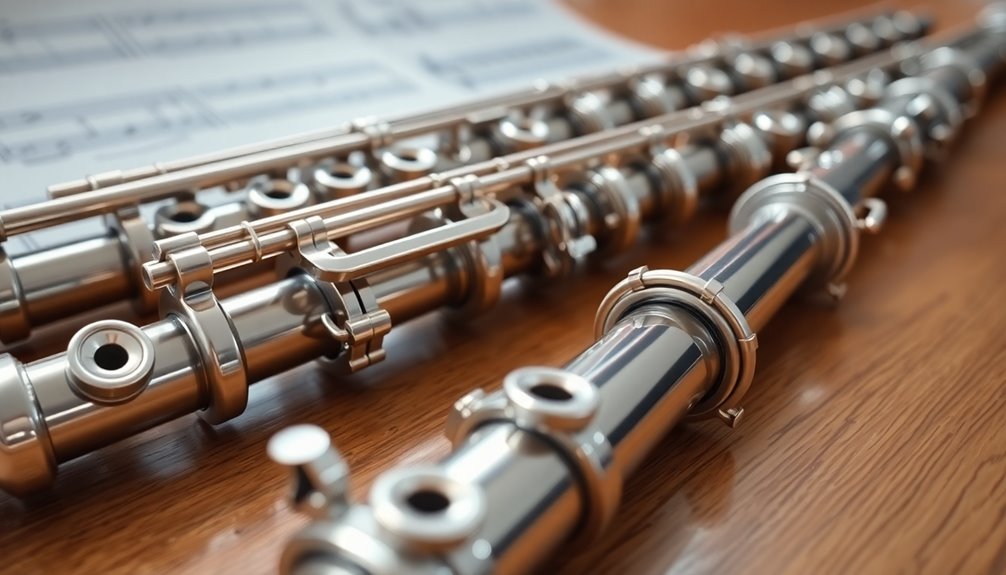
When choosing an intermediate flute, understanding the key features to reflect on can greatly enhance your playing experience. One of the most critical aspects to take into account is tone quality. As you progress in your musical journey, you'll likely want a flute that produces a rich, warm sound.
Look for flutes with solid silver or silver-plated bodies, as these materials often yield superior tone quality compared to beginner instruments. A well-crafted headjoint can also greatly influence your sound; try experimenting with different styles to find one that complements your playing technique.
Next, evaluate the flute's key mechanism. Intermediate flutes often come equipped with more advanced key designs that improve responsiveness and ease of play. Features like pointed key arms and open hole keys can offer greater control over your sound, allowing you to express yourself more freely.
These enhancements not only aid in developing your playing technique but also contribute to a more nuanced performance. Additionally, investing in a flute from a brand known for its meticulous craftsmanship can ensure reliability and exceptional sound quality.
Don't overlook the importance of ergonomic design. A comfortable grip can be a game-changer, especially during long practice sessions. Make sure that the flute feels good in your hands; you'll be more likely to play with confidence and enjoyment.
Ultimately, selecting the right intermediate flute involves balancing tone quality, key mechanisms, and comfort. By keeping these features in mind, you'll not only improve your playing technique but also deepen your connection to music, fostering a sense of belonging within the musical community.
Top Flute Brands for Intermediates
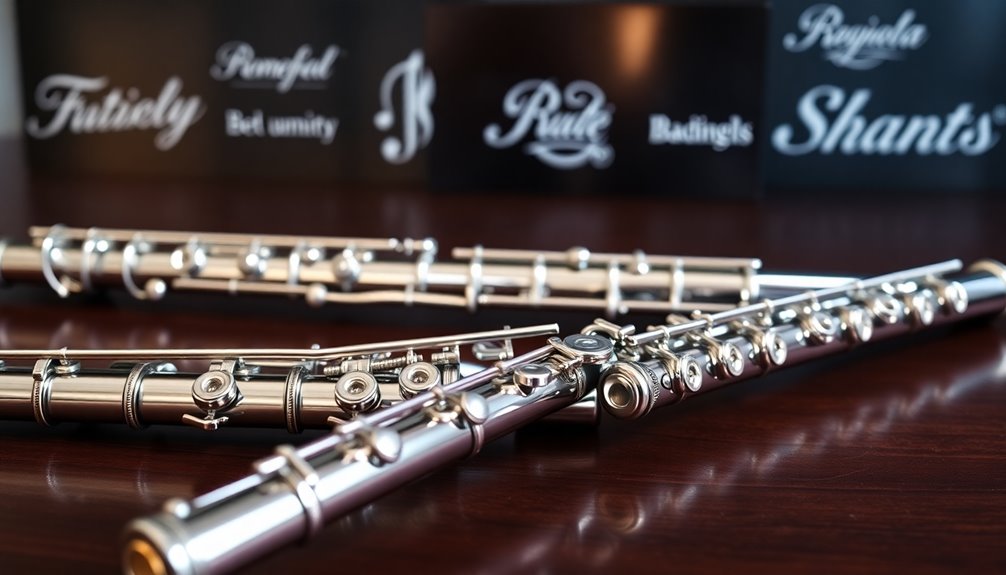
Exploring the top flute brands for intermediates can greatly impact your shift to a more advanced playing level. When you're ready to elevate your sound and technique, two notable brands stand out: Yamaha and Azumi.
Yamaha flutes have long been a favorite among musicians. Known for their exceptional craftsmanship and reliable performance, Yamaha offers a range of flutes that cater to intermediate players. Their instruments are designed to produce a warm, rich tone while maintaining excellent intonation.
The ease of playability is another hallmark of Yamaha flutes, allowing you to focus on developing your skills without wrestling with your instrument. Additionally, the Yamaha YFL-222 is particularly praised for its durable construction, ensuring that it will withstand the rigors of practice and performance.
On the other hand, Azumi flutes present a unique option for those seeking a more specialized sound. Azumi flutes are crafted with a distinctive headjoint design that promotes greater flexibility and responsiveness. This feature can truly enhance your playing experience, giving you the freedom to explore a wider range of expression and dynamics.
Plus, the build quality of Azumi flutes is impressive, ensuring that you'll invest in an instrument that will last through your musical journey.
Both Yamaha and Azumi flutes provide excellent options for intermediate players, each with its own set of advantages. As you navigate your choices, consider what aspects matter most to you: is it tonal quality, ease of play, or perhaps a unique design?
Selecting the right brand can make all the difference in your progress as a flutist, helping you feel more connected to your music and your instrument.
Recommended Models and Reviews
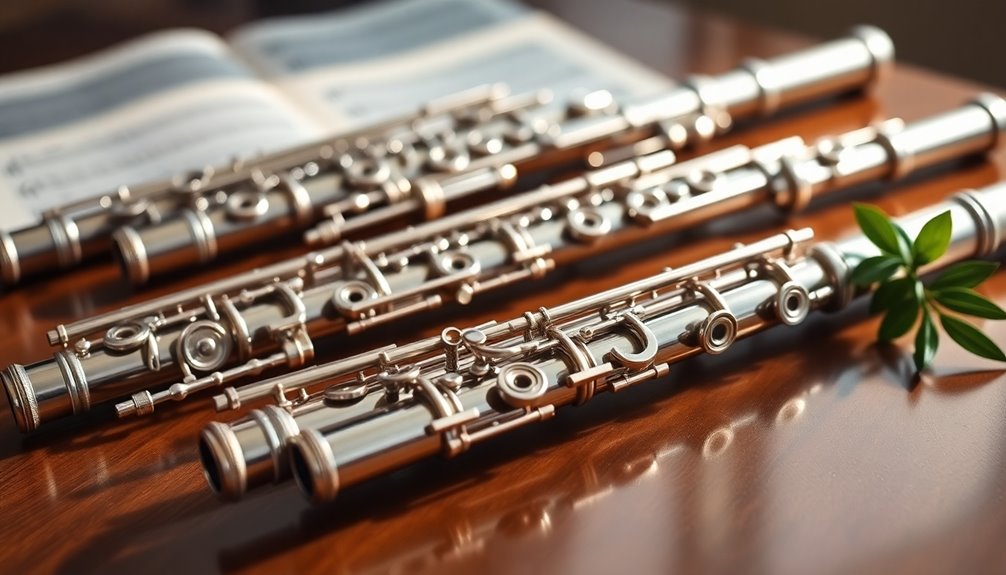
As you explore the world of intermediate flutes, selecting the right model can considerably influence your development as a musician. Your choice can shape your flute sound and enhance your playing techniques, helping you grow into a more confident performer.
Here, we'll discuss a few standout models that have received rave reviews from both players and educators.
The Yamaha YFL-482H is a popular choice among intermediate flutists. With its solid silver headjoint, this flute offers a warm and rich sound that resonates beautifully. Players appreciate its responsiveness, making it easier to execute advanced playing techniques like vibrato and dynamic control.
Another excellent option is the Jupiter JFL-700 series. It features a silver-plated body and a handcut headjoint, allowing for a bright and clear tone. The JFL-700 series is known for its durability and ease of play, which can help you tackle challenging pieces with greater confidence.
For those seeking a more professional edge, the Azumi AZ2 model is worth considering. This flute uses a silver headjoint and a nickel-silver body, providing a balanced sound with excellent projection. Players often praise its smooth key action, which can enhance your overall playing experience and encourage further exploration of complex techniques.
Ultimately, the right intermediate flute won't only support your current skills but also inspire you to reach new musical heights. Open-hole flutes, in particular, can offer better control over dynamics and timbre, enhancing your overall musical expression.
As you try out these models, pay attention to how they resonate with your personal style and playing aspirations.
Tips for Choosing the Right Flute
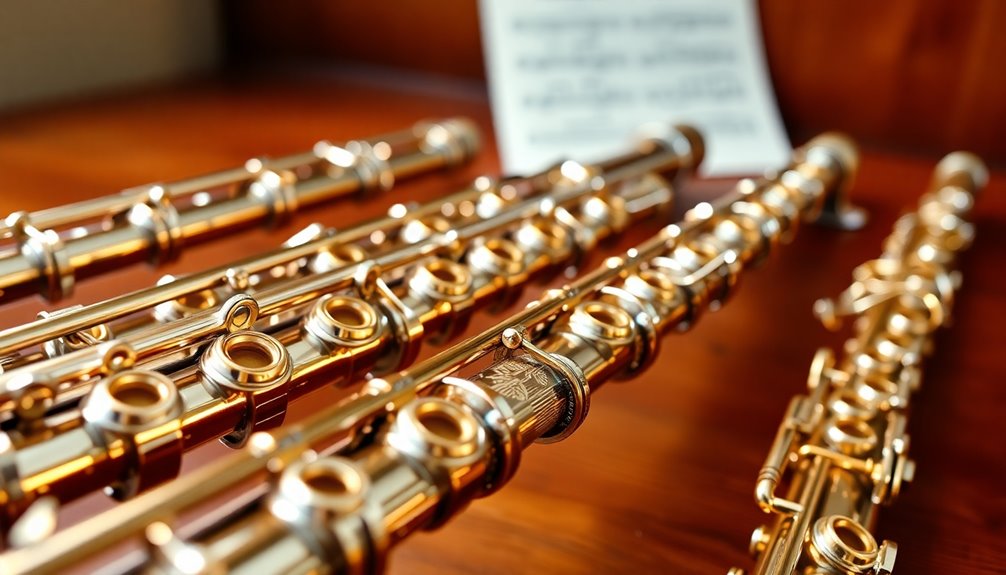
Choosing the right flute involves considering several key factors that can considerably impact your playing experience. Understanding flute types and how they align with your playing style is essential to make an informed decision. Here are some tips to guide you in your selection:
| Factor | Description | Considerations |
|---|---|---|
| Flute Types | Choose between straight flute, piccolo, or alto flute. | Each type has a unique sound; consider what resonates with you. |
| Material | Common materials include silver, nickel, and wood. | Different materials produce varied tones; your budget may influence this. |
| Key Mechanism | Look at open vs. closed hole key systems. | Open hole allows for more advanced techniques; closed holes are easier for beginners. |
| Brand Reputation | Research reputable brands like Yamaha or Pearl. | Trusted brands often have better build quality and customer support. |
Before making your choice, think about what you want to achieve with your flute. If you're aiming to play in orchestras, a solid silver flute might be ideal. If you prefer solo performances, a wooden flute could enhance your sound. Additionally, consider key mechanisms that can influence your playability and technique.
Ultimately, try different models to see what feels right in your hands. Engage with fellow flutists to gather insights and experiences. By considering these factors and connecting with the flute community, you'll find a flute that not only meets your needs but also enhances your musical journey.
Maintenance and Care for Your Flute
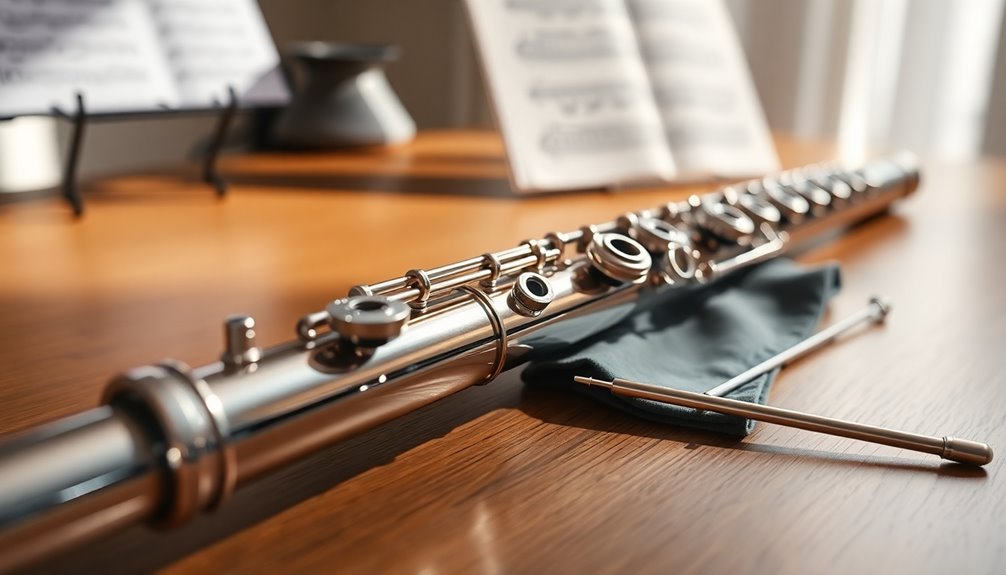
Owning a flute is just the beginning; maintaining it properly guarantees it performs beautifully for years to come.
Regular maintenance not only enhances your playing experience but also fosters a deeper connection with your instrument.
Here are three essential steps to keep your flute in prime shape:
- Flute Cleaning: After each practice session, take a moment to swab out moisture using a cleaning rod and cloth. This simple act helps prevent moisture buildup, which can lead to tarnishing and damage over time.
- Regular Inspections: Check for any visible signs of wear or damage. Look closely at the pads, springs, and joints. If you notice any pads are leaking or not sealing properly, it might be time for a pad replacement.
- Professional Servicing: Schedule regular visits to a qualified technician for a thorough check-up. A professional can address any intricate issues you might overlook, ensuring your flute remains in peak condition. Additionally, consider investing in a Deluxe Flute Care Kit to support your maintenance efforts and enhance the longevity of your instrument.
Frequently Asked Questions
What Is the Best Flute for Orchestral Playing?
When you're considering the best flute for orchestral playing, focus on how well it supports your flute technique and suits the orchestral repertoire.
A solid, responsive instrument allows for dynamic expression and rich tone, essential for blending with other sections. Look for features like a solid silver headjoint and a reliable mechanism; these enhance your performance capabilities.
Ultimately, the right flute should resonate with you, helping you feel connected to the music and your fellow musicians.
How Long Should an Intermediate Flute Last?
An intermediate flute should last you several years, often even decades with proper care.
Flute longevity depends on regular maintenance, so keep it clean and avoid extreme temperatures. Use a soft cloth to wipe down the body after each session and check for any loose screws or pads.
Are There Specific Brands for Jazz Flutes?
Ever felt the thrill of a jazz solo that just speaks to your soul?
When you're diving into jazz, specific brands really stand out. Look for jazz flute brands like Yamaha and Pearl; they're often recommended for their rich tone and responsiveness.
Models like the Yamaha YFL-577 and Pearl PF-665 are particularly praised. Choosing the right jazz flute can transform your playing and help you connect deeply with the music.
Can I Upgrade My Flute Later?
Absolutely, you can upgrade your flute later.
As you progress, you might find that your current instrument doesn't meet your evolving needs. Flute upgrades can greatly enhance your playing experience, offering better sound quality and advanced features.
When selecting future instruments, consider what aspects you want to improve. Staying informed about options will help you feel more connected to your musical journey, ensuring you find the perfect flute that complements your growth.
What Is the Difference Between Student and Intermediate Flutes?
When you compare student and intermediate flutes, you'll notice key differences in features and materials.
Student flutes often use basic materials like nickel-silver, which keeps costs low, while intermediate flutes typically incorporate higher-quality materials, such as silver or a silver-plated finish, enhancing sound quality.
Additionally, intermediate flutes may have more advanced features, like pointed key arms and better pads, allowing you to explore your musicality and express yourself more freely.
Conclusion
In your quest for the perfect intermediate flute, remember that like a skilled bard weaving melodies, your instrument should resonate with your unique style. As you've explored key features, brands, and models, trust your instincts to guide you. Choosing the right flute is akin to selecting a confidant in a grand adventure; it should inspire and elevate your musical journey. With proper care and maintenance, your flute will not only sing but also stand the test of time, echoing your passion for years to come.





